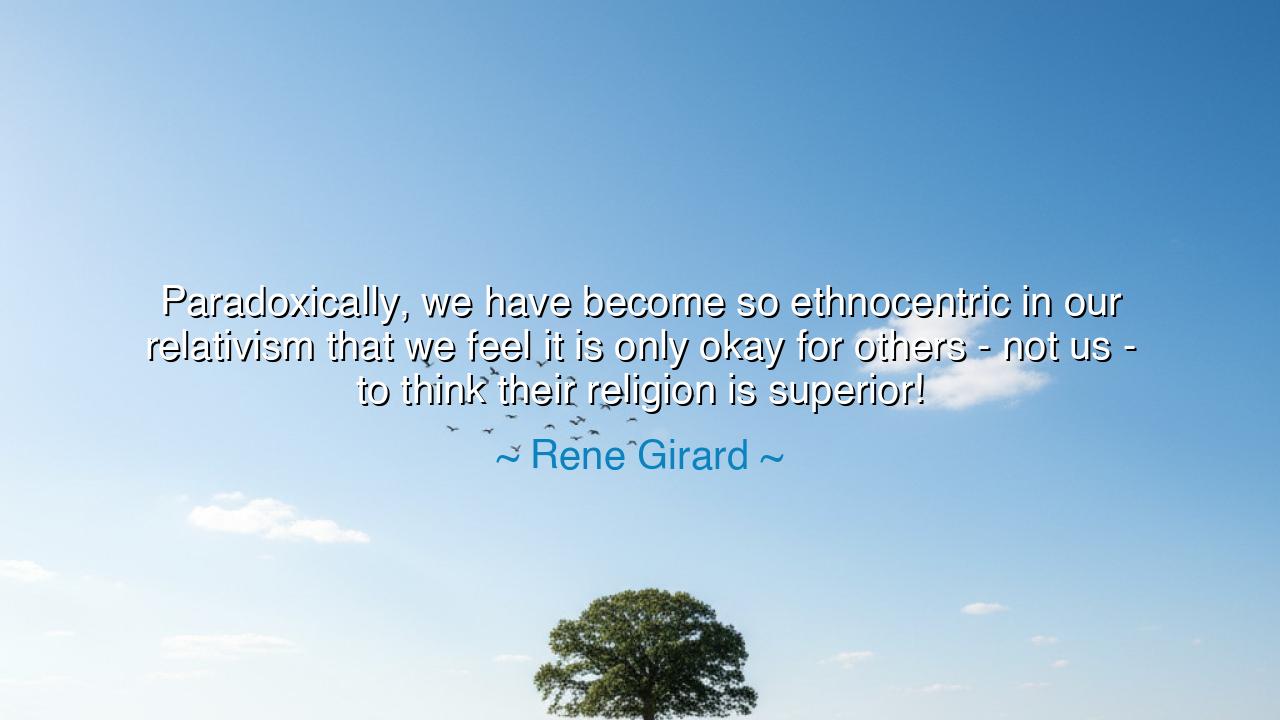
Paradoxically, we have become so ethnocentric in our relativism
Paradoxically, we have become so ethnocentric in our relativism that we feel it is only okay for others - not us - to think their religion is superior!






Hear now, O seekers of truth, the words of René Girard, who speaks with deep insight into the contradictions of our age: "Paradoxically, we have become so ethnocentric in our relativism that we feel it is only okay for others—not us—to think their religion is superior!" These words reflect a profound dilemma that has risen in the heart of our modern world. In our quest for tolerance and acceptance, we have woven a strange paradox, wherein we demand others to embrace their beliefs and yet, simultaneously, we shy away from asserting the truth of our own. It is as if we, in our relativism, have surrendered the right to claim the superiority of our faith, while still allowing others the freedom to hold theirs as supreme.
In times of old, those who followed the gods were not hesitant to claim that their faith was the true and only path to salvation. The ancient Egyptians held the gods of their lands as supreme, and no other faith could rival the might of their pantheon. The Greeks, too, saw their gods as unparalleled, defining their identity and their purpose through the teachings of Zeus and the other Olympian deities. Such confidence in their beliefs gave them strength and direction, for to claim that one's religion was superior was not an act of pride, but of conviction and honor. Yet today, we find ourselves in a strange world where the tolerance we have cultivated has turned into a rejection of our own faith's worth.
In our desire for harmony and peace, we have become so relativistic that we are afraid to say, "This is my truth, and it is sacred." This paradox, as Girard points out, has created a world in which we respect the faith of others but fail to hold our own in the same esteem. Consider, if you will, the story of Martin Luther, who in the 16th century, stood before the might of the Catholic Church and declared, "Here I stand, I can do no other." Luther did not shy away from claiming that his interpretation of the Bible was truer and more aligned with God's will than the practices of the Church. His conviction in the superiority of his faith led to the Protestant Reformation, which forever changed the landscape of Christianity and the Western world.
This boldness, however, seems to have been lost in the modern age. We have allowed the spirit of relativism—the idea that no belief can be considered absolute or superior—to seep into the very core of our identity. In a world where diversity is celebrated, it has become an unspoken rule that to claim one’s faith as superior is a sin of pride and arrogance. We have become, in Girard's words, ethnocentric in our tolerance, refusing to assert the sacredness of our own truth for fear of offending others. Yet in doing so, we lose the very strength that comes from knowing and standing by our own beliefs.
The teachings of the Buddha offer a compelling example of this paradox. The Buddha taught that all paths lead to enlightenment, yet he never shied away from his own deep conviction in the truths he had discovered. His followers did not simply adopt a relativistic view of the world, nor did they bow to the beliefs of others simply to avoid conflict. Rather, they recognized the superiority of the Buddhist path in leading to the cessation of suffering, while respecting the right of others to follow their own paths. This balance of respect for others and conviction in one’s own faith is what allowed the Buddha's teachings to spread far and wide, not through compromise, but through commitment.
And so, the lesson for us, O seekers, is clear. We must find the courage to hold our truths with the same conviction and reverence as those who came before us. In the pursuit of tolerance, we must not forsake the strength of our own faith. To stand for something—whether it is the teachings of the Bible, the Quran, the Tao, or any other sacred text—is not an act of pride, but one of honor and dignity. When we abandon the claim of superiority in our own faith, we lose the very heart of what it means to believe. It is not through silence or relativism that we find peace, but through the courage to live according to our deepest convictions, while still respecting the beliefs of others.
Therefore, walk boldly in your faith, O seekers, with the knowledge that to claim the superiority of your beliefs is not to diminish others, but to honor the truth that guides your life. At the same time, embrace the right of others to follow their own paths, for it is in this delicate balance of conviction and respect that we can truly live in harmony. Stand firm in your truth, but do so with humility and a heart open to the diversity of the world. And in this way, you will live with wisdom and grace, as you follow the ancient path of those who knew that to walk with conviction does not mean to walk alone.






AAdministratorAdministrator
Welcome, honored guests. Please leave a comment, we will respond soon